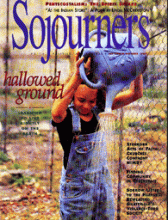Religious groups, non-governmental organizations, and governments from around the world have been mobilizing to protest French President Jacques Chirac's decision to conduct eight more nuclear tests in the South Pacific between September 1995 and May 1996. Recently, France agreed to an extension of the Non-Proliferation Treaty once the wording was changed to say that countries would use "utmost restraint" in nuclear testing.
According to the Pacific Concerns Resource Centre (PCRC) in Australia, demonstrations and boycotts by many countries in the South Pacific were under way almost immediately after Chirac's announcement. A group of non-governmental organizations in Fiji has been collecting signatures for a petition addressed to Chirac that cites the "wounds" from more than 300 nuclear bomb tests in the region since 1945, and demands that France reconsider its decision to resume nuclear testing at Mururoa Atoll in September.
The Rainbow Warrior, a ship belonging to the environmental organization Greenpeace, was detained by the French navy after attempting to enter the area around the test site. Ten years ago, the French sank the first Rainbow Warrior during a similar protest. Australian citizens have also responded to the threat of renewed testing with a boycott of French products.
Religious groups such as the Lutheran World Federation, the Conference of European Churches, and the World Council of Churches have been outspoken in denouncing France's decision to renew testing. In particular, the Lutheran World Council has challenged its member churches to press their governments to sign the Non-Proliferation Treaty and to give "pastoral support" to people involved in nonviolent demonstrations to protest the nuclear testing.
To protest the renewal of French nuclear testing in the South Pacific, contact President Jacques Chirac, Palais de L'Elysee, 56 rue du Faubourg Saint-Honore, Paris 75006; fax: 011-33-1-474-22465.
Read the Full Article
